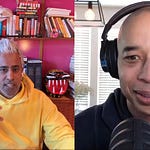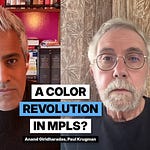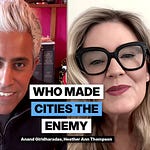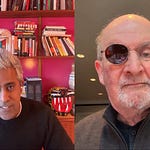Anand was on Morning Joe today, responding to Donald Trump and J.D. Vance’s continuing racist lies about Haitian immigrants in his native state of Ohio, and talking about what is real: that immigrants are among America’s greatest gifts.
Watch the video above, read Anand’s essay below, and read some text excerpts from his comments on Morning Joe, below the fold.
A request for those who haven’t yet joined us: The interviews and essays that we share here take research and editing and much more. We work hard, and we are eager to bring on more writers, more voices. But we need your help to keep this going. Join us today to support the kind of independent media you want to exist.
“There are concert lines around the world for people trying to get in on this dream”
On Trump’s recent comments on blocking immigration from “infested” countries:
What I hear is a wannabe Nazi — without the organizational skills. I hear someone who is literally reclaiming language from the 1930s and 1940s in Germany — “vermin,” “infestation.”
This is the language of someone who is not just trying to win an election, although they are trying to do that. This is the language of someone who is trying to build a pretext for what he might do if in office.
He's talked about deporting millions and millions of people on a scale that would require 24/7 train cars and buses — and camps, to use another mid-20th century word.
But also, I think — and the example of the Haitian community in Springfield illustrates this — someone who is using a modern media environment to spread information, put out lies, that will then possibly inspire other people, private actors, to do things in their own name, with deniability for Donald Trump. Activating his stand-up-and-stand-back-and-stand-by paramilitary friends to go do all manner of things to vulnerable people.
Because once you're telling millions and millions of people that there's vermin around, there's infestation, they're taking over the country, there's a replacement scheme/scam happening, violence will happen.
On Trump and Vance’s dehumanization of Haitian immigrants in Ohio based on lies about what they ate:
It was a trifecta for me. I am a native Ohioan. I am a son of immigrants. And I'm a passionate eater and cook. And so this sudden national story about this dehumanization of immigrants based on what they eat [brought up] a couple of things.
First of all, in a lot of countries in the world with unstable political systems and high levels of violence, lies about what other people eat are actually crucial to how political violence happens. In India, where my family comes from, if you look at most episodes of lynchings or riots, it is Hindus and Muslims and rumors about, I smelled pork, I smelled beef, you're inappropriately smuggling something you shouldn't have been eating.
A lot of countries in the world have taboos around food — and violence. So what was happening in Ohio is a playbook that is very familiar. If you've covered politics in developing countries, it is a classic dehumanization thing to say these people are the other. As Kendrick Lamar would say, “They not like us.” They eat differently from us.
On what immigrants do eat:
But it got me thinking: What do immigrants eat? Because immigrants don't eat what Donald Trump and J.D. Vance are lying about.
One thing immigrants eat in this country is flavors that everybody else eventually eats and capitalizes on. And then you have gochujang in fancy little New American restaurants, and you have fish sauce in a vinaigrette several years later.
But immigrants are people who bring that flavor to us — and what is multiracial democracy but flavor?
Immigrants swallow their pride, often, to come to this country — come to places like Springfield, Ohio, often do jobs that they wouldn't have had to do back home. They are computer programmers back home, they work in a gas station in Springfield because they know that, to rise in America, you must first fall sometimes. So they eat their own pride. They often eat very little in the hope that their children will eat like kings.
They eat the cheapest food they can get at Costco because they can taste what their grandchildren, unborn grandchildren, will eat one day. When I was growing up in Ohio, in my immigrant family, we ate pasta some days because my mom actually really enjoyed the freedom that America gave her as an Indian woman to not spend all the time in the kitchen, like Indian women like her would've spent back home. And sometimes we ate Indian food because she wanted us to have something of where she came from and to sustain the past forward. So these people are trying to get folks killed with lies about what immigrants eat. But I wanted to share with folks in my experience what immigrants do eat.
On 7 a.m. lines worldwide and protecting not just the border but also the dream
We're in the 7 a.m. hour, and I have an image seared in my memory. I have the privilege in my job of reporting from around the world. There is a 7 a.m. image that I have seen in many, many countries around the world, which a lot of Americans watching this may not have seen.
Which is that at 7 a.m., in capitals around the world, when life is not very active in particular cities, there is a long line always outside the American embassy or the American consulate.
When life is at a standstill at 7 a.m. in New Delhi, India, there is a line outside that embassy.
We are sitting around this table, sitting at home, maybe in a funk about America. We may be despairing about America. We may think our democracy's unraveling, and this is happening and that's happening, and everything's going to the dogs. But even when we are in our deepest funk, that line — I have never seen that line go down.
That line is like a concert line in capital after capital after capital. So instead of just having this conversation about how we protect the border, let's step back. Let's channel what Ronald Reagan said in his farewell address, where we remember that we are a country made of the world, and it is actually the secret of our greatness.
And the fact that, even at our lowest lows, there are concert lines around the world for people trying to get in on this dream — it should make us buck up, but it should also make us remember not to shut this country to the energy and new blood that has always made it what it is.
A request for those who haven’t yet joined us: The interviews and essays that we share here take research and editing and much more. We work hard, and we are eager to bring on more writers, more voices. But we need your help to keep this going. Join us today to support the kind of independent media you want to exist.











